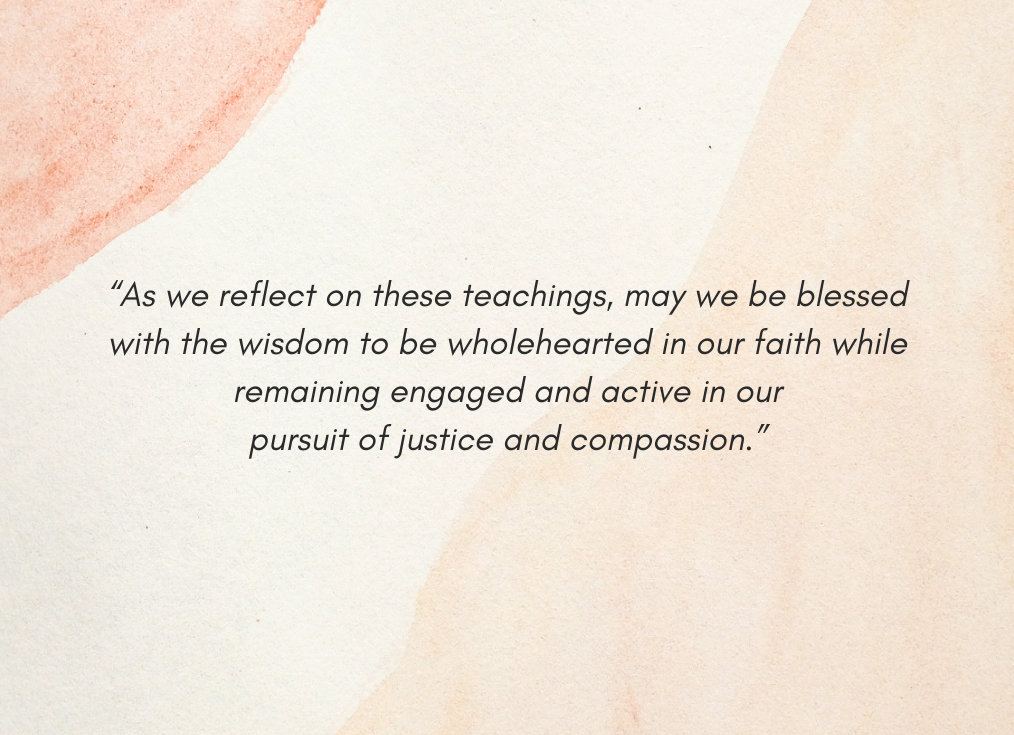Wholehearted Faith

In this week’s Torah portion, Shoftim, we encounter a powerful directive that resonates deeply with the core of our faith: “You shall be wholehearted with Adnai your Gd” (Deuteronomy 18:13). This command, using the Hebrew word “tamim,” is often translated positively as “wholehearted,” “committed,” or “dedicated.” However, this translation presents us with an intriguing linguistic and philosophical puzzle when we consider its simplified root form, “tam,” used to describe one of the four sons at the Passover Seder—the “simple” son.
How do we reconcile these seemingly conflicting uses of the same root word? Our great sages have grappled with this dilemma, offering three primary explanations:
- The simplest approach suggests that “tam” and “tamim” carry different meanings. Although simple in its approach, this explanation falters when we consider the common epitaph found on traditional Jewish tombstones: איש תם וישר (ish tam v’yashar), “a simple and upright man.” If simplicity were not a virtue, why would our tradition encourage its use as a posthumous praise?
- A more nuanced interpretation suggests that the Torah’s specific command to be “wholehearted with Gd” implies that such wholeheartedness is inappropriate in other contexts. This view suggests that the “tam” of the Haggadah represents a negative trait of simple-mindedness, contrasting with the positive “tamim” in our parshah.
- The most profound explanation, offered by our greatest sages, proposes that being “wholehearted” or unquestioningly enthusiastic about faith is, in essence, a form of simple-mindedness—a pure acceptance without hesitation. This interpretation suggests that such innocence of thought, which leads us to accept faith as fact without wasting time on doubt, is a virtue in our relationship with the Divine. However, applying this same unquestioning acceptance to other aspects of life would indeed be foolish.
…
This third interpretation offers us a powerful insight into the nature of faith and its role in our lives. Our tradition teaches us that faith should provide comfort and support, reducing our anxieties and allowing us to focus on our daily lives with clarity and purpose. Many scholars, philosophers, and religious leaders have echoed variations of the idea that “you can only control the things that are within your control.” Conversely, as the great Hall-of-Fame coach Lou Holtz famously stated, “Don’t be a spectator, don’t let life pass you by.”
These teachings challenge us to find a balance between wholehearted faith and active engagement in the world around us. During this reflective month of Elul, as we approach the High Holy Days in only a few short weeks, we must ask ourselves: Where do we fall on the spectrum between passivity and activity in our lives and relationships? Do we spend more time questioning Gd’s existence than asking how we can help our fellow human beings? Are we more curious about ancient biblical stories than the living stories of those around us? Do we wonder why Gd isn’t taking action while forgetting to take action ourselves?
As we contemplate these questions, we must also grapple with the mandate found earlier in this week’s parshah: “Justice, justice, shall you pursue” (Deuteronomy 16:20). This directive calls us to action, challenging us to define what pursuing justice or righteousness means in our individual roles and circumstances. How do we balance this call to action with the caution against being too “simple-minded” in our worldly affairs?
In light of the tragic news of the six hostages killed by terrorists in Gaza last weekend, this call to pursue justice takes on even greater urgency. We are reminded that our faith, while wholehearted, must not render us passive in the face of injustice and suffering. Instead, it should inspire us to act, to seek peace, and to work tirelessly for the betterment of our world.
As we reflect on these teachings, may we be blessed with the wisdom to be wholehearted in our faith while remaining engaged and active in our pursuit of justice and compassion. May we find the strength to comfort those in pain and the courage to stand up against injustice. And may our actions, inspired by our faith, bring peace and healing to a world in desperate need of both.
In this time of sorrow and reflection, we pray for peace and comfort for all those affected by the war in Israel. May the memories of the lives cut short since 10/7 be for a blessing; may those still being held captive be returned as swiftly as possible; and may we honor the future generations who look back on this day by redoubling our efforts to create a more just and peaceful world.
We hope you, your family, and your friends, neighbors, and colleagues, join us on 10/7 at our community-wide one-year anniversary of the 10/7 tragedy. Please click HERE to register to attend this special gathering where our community rabbis will be followed by a special musical performance by Israeli band, HaShayara, who will also share first-hand accounts of life in Israel post-10/7. Because we are…
Shabbat Shalom.

